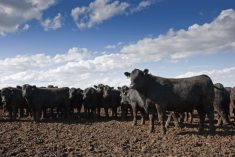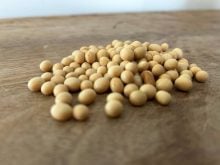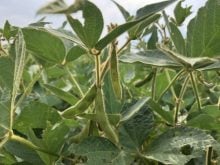For the week ending March 1, Western Canadian feeder markets traded steady to $6 higher compared to seven days earlier. Despite expected tariffs, there was no fear to secure ownership. Strong buying interest was noted from Alberta and Ontario operators with larger operations setting the price structure.
Backgrounded, quality genetic strings of steers weighing 800-850 pound were the features at many sales. Short-keep 850-pound plus cattle were also well bid; however, discounts were noted on fleshier types and second cut, mixed packages. Heifers over 850 pounds were relatively unchanged from last week as feedlots can’t push the efficiencies on these cattle. Calves were setting fresh highs in some cases but the price structure was quite variable across the Prairies.
Read Also

U.S. grains: CBOT soybeans, corn, wheat fall in USDA data aftermath
Chicago grains took a dive on Friday, following a closely watched U.S. government crop report and the release of export data that could provide clues into Chinese buying.
In central Alberta, lower flesh tan steers weighing 960 pounds on light barley and corn silage diet with full processing data traded for $360. North of Saskatoon, run-of-the mill mixed steers carrying medium butter levels averaging 960 pounds traded for $349. Northwest of Winnipeg, larger frame red heifers on the card at 986 pounds notched the board at $336. In central Alberta, 900-pound Charolais heifers supposedly moved through the ring at $345.
At the Lloydminster sale, Charolais lower flesh steers weighing a hair over 800 pounds silenced the crowd at $413. At the same location, Simmental based heifers evaluated at 830 pounds supposedly traded for $355. At the Ste. Rose Auction, red mixed steers weighing a shade under 700 pounds dropped the gavel at $425. At the same barn, similar quality heifers averaging 707 pounds sold for $392. South of Edmonton, Angus blended steers on light grain and silage diet with full pre-conditioning averaging 688 pounds sold for $437.
Northwest of Saskatoon, British based steers scaled at 610 pounds apparently sold for $481. Southeast of Calgary, pre-conditioned Charolais steers weighing just over 600 pounds were valued at $495. In the same region, fully processed Simmental based heifers evaluated at 600 pounds were quoted at $425.
At the Rimbey sale, Limousin Angus blended, fully processed steers weighing 550 pounds on silage and hay diet traded for $525. Southeast of Saskatoon, semi-weaned Charolais steers averaging 505 pounds were valued at $570. In Central Saskatchewan, red mixed heifers on the card at 510 pounds reportedly moved through the ring at $490.
Alberta packers were buying fed cattle on a dressed basis of $458-$460/cwt delivered, down $2/cwt from last week. Using a 60 per cent grading, this equates to $275-$276 on a live basis. Packers were buying cattle right through to early April delivery and this allowed feedlots to take a fair amount of risk off the table.
— Jerry Klassen is president and founder of Resilient Capital, specializing in proprietary commodity futures trading and market analysis. Jerry consults with feedlots on risk management and writes a weekly cattle market commentary. He can be reached at 204-504-8339 or via his website at ResilCapital.com.















